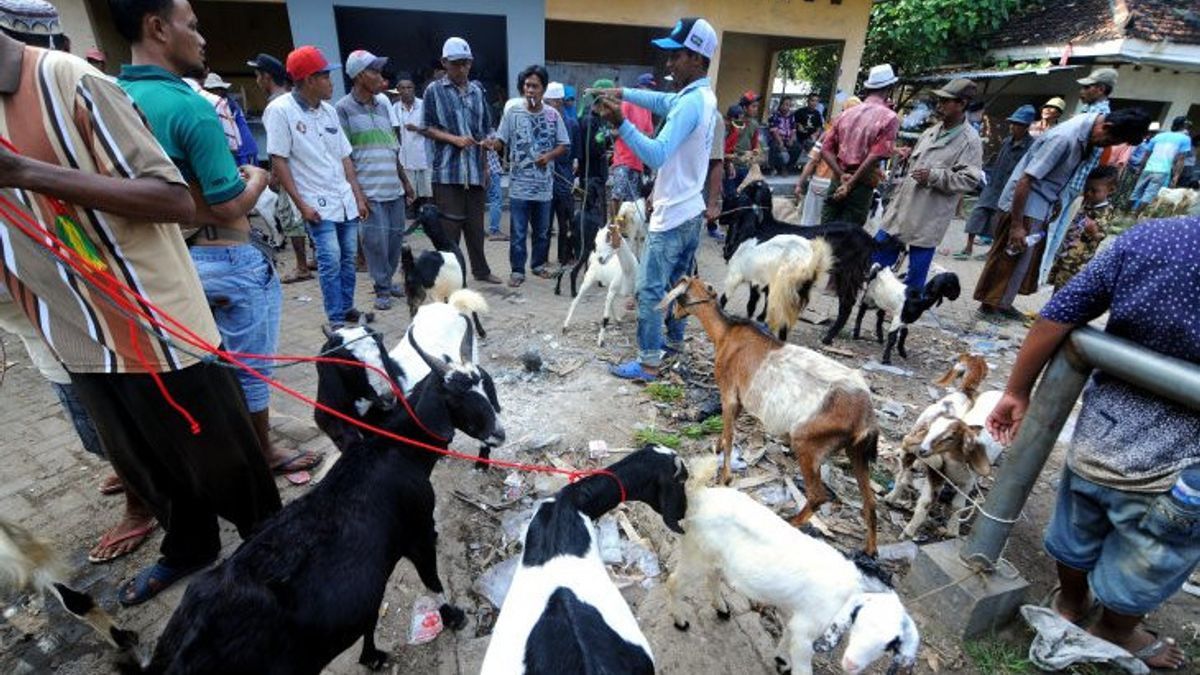JAKARTA - Mouth and Nail Disease (FMD) in livestock is increasingly widespread. The government should also direct its attention to home-scale farms.
"In villages, many people raise cows or goats at home. Home-scale farming must also receive attention from the government to anticipate the spread of PMK," said Member of Commission IV DPR Daniel Johan, Friday, June 17 in a written statement.
Referring to data from the Ministry of Agriculture (Kementan) as of Wednesday (15/6), there were 170,018 livestock affected by FMD with details of 18 provinces spread over 190 cities and regencies. Of these, 46,549 animals were declared cured and 801 died. The rest are still sick, and some are conditionally cut.
Currently, the Government is trying to break the chain of FMD spread through a vaccination program for animals that have not been exposed to FMD. Daniel asked that the vaccinations also target cows or goats raised by residents in their homes.
“Vaccination in large farms is very important. But we must not forget small-scale farmers. Because in villages, cows or goats are investments in people's lives,” he said.
“Agricultural service members have to enter the villages. Check and vaccinate the resident's cattle. Immediately take treatment if a sick cow is found,” added Daniel.
Furthermore, Commission IV, which is in charge of agriculture and animal husbandry affairs, asked the government to carry out socialization and education to lower levels. According to Daniel, the spread of PMK has frightened many people.
"It's a pity for the residents if the cows that are their investment in their lives die due to lack of anticipation and handling. PMK should not harm the small people," he said.
On the other hand, Daniel hopes for an acceleration of the vaccination program for livestock. Indonesia itself still has to import FMD vaccine from other countries, while the amount of vaccine needed to fight this disease is at least 80% of the infected population.
"So we encourage the Government, in this case the Ministry of Agriculture to cooperate with research institutions, academics and the private sector to develop FMD vaccines so that we no longer need to depend on other countries," said Daniel.
The legislator from the West Kalimantan I Dapil also reminded the Ministry of Agriculture to coordinate with other relevant ministries/agencies in handling PMK. Daniel said that the spread of PMK can have an impact on the production of cattle derivatives which will certainly affect the regional and national economy.
“For example, the production of milk or packaged meat. We have to think about what is the best solution because of course PMK will also decrease the production of cattle derivatives. Emergency measures must be prepared if the PMK problem gets bigger," he explained.
Daniel added, the government needs to consider stamping out or culling infected animals to break the chain of FMD spread. Moreover, Eid al-Adha will soon arrive.
"Together with the acceleration of vaccination, stamping out can be an additional effort to stop the spread of the virus that causes FMD ahead of Eid al-Adha," said Daniel.
Even so, the government was asked to provide compensation for the owners of the culled livestock. Daniel believes that stamping out will also calm the concerns of residents who want to make sacrifices during Eid al-Adha.
“I think Muslim friends will be calmer if they know that there are no more livestock infected with FMD. But the owner of the slaughtered cow must receive compensation from the government so that it does not suffer a loss,” he said.
Daniel said, FMD in livestock must be addressed quickly because the spread of the disease has made livestock prices plummet, especially in cattle-producing areas. He also assessed that the culling of livestock affected by FMD would stop bigger losses.
"If the PMK is not resolved quickly, the domino effect will be large. This will actually harm the national economy in the midst of the Government's efforts to recover the economy due to the Covid-19 pandemic," explained Daniel.
It is feared that the distribution of animals will also cause farmers to be overwhelmed, especially with restrictions on cattle traffic or lockdowns from areas exposed to FMD. Daniel said that many farmers were nervous because their cows were still adrift in the port due to this policy.
“Trade within the region will be sluggish if the PMK problem is prolonged. Now there is a phenomenon of blantik or cattle buyers who bid and buy cows at low prices so that it makes farmers lose money. This must be a common concern," he concluded.
The English, Chinese, Japanese, Arabic, and French versions are automatically generated by the AI. So there may still be inaccuracies in translating, please always see Indonesian as our main language. (system supported by DigitalSiber.id)













